This is gonna be one of those blog posts that are way too serious about an issue that’s at most not that important and at worst absolutely stupid. But it seemed kind of interesting and a bit funny to write about so here we are.
I’ve been playing The Legend of Zelda: Breath of the Wild for the past several weeks. I’m currently at more than 115 hours of play. Around hour 90 I realized that I had made a drastic change in a certain aspect of how I was playing the game; specifically how I was interacting with the natural environment of the game world.
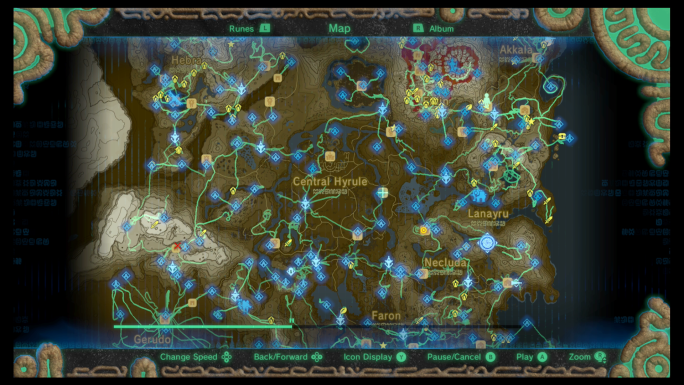
Depending on the game and how it works, I try to apply my own real world ethical views to how I play most games. This affects how I answer in conversations and make decisions in games like Mass Effect. It informs how I progress through TellTale Games titles. It even affects how I deal with the game’s environment where applicable. Obviously there are exceptions, but in general this is how I approach games. In real life, I’m an environmentalist. No I’m not a vegan or some other such annoying person on a moral high horse. But I do believe that the environment and its preservation are crucial to the continued survival of humanity. This too affects the way I play video games and I don’t think my views on this issue have ever affected me as much as they have while playing Breath of the Wild.
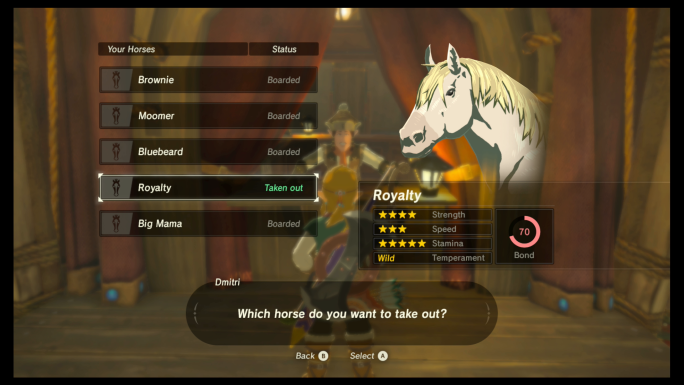
Breath of the Wild is an amazing game because of how much freedom it gives you to interact with the world. If you want to ride a horse, you can literally run out to a field and jump on a horse’s back. It takes patience and effort but you can do it. And doing it is a great feeling. Then, if you choose to, you can keep that horse. You can befriend it. You can stable it. You can release it. The game encourages you to build relationships with your horses and only allows you to own a limited number of them at any given time. It asks you to name them and build relationships with them. Then if you get a horse you like better, usually one with better strength and speed, you have to decide which horse to release to make room for it. It’s an overall beautiful and personal experience. But horses are just a small part of how you can interact with the environment in this game.
One of the biggest ways you interact with the environment in Breath of the Wild is by farming natural resources. There are many types of resources such as insects, minerals, meat and other wild life products, and plants. For me, the most personally impactful resources in the game are meat from animals and wood from trees. Unlike the other Zelda games, this is an RPG. That means you need lots of resources to accomplish various things such as leveling up your armor, completing quests, and often most importantly, making money. Money is very scarce in Breath of the Wild. It’s not like in the other games in the series where you can just cut grass and get rich in a matter of minutes. As I said, I’m more than 115 hours in and I still don’t have that many rupees. The game asks you to spend quite a lot and offers you very little money for free. Instead you have to actively earn the money you need to accomplish things like buying armors, refilling your supply of arrows, and purchasing a house. Yes that is a thing you can do in this game. In my opinion, the quickest way to make money is by selling meat skewers. These are obtained by collecting meat from animals, cooking them, and then selling them to any vendor. Another way you constantly interact with the environment is by collecting wood, which is used for starting fires, crafting certain items, and is even required to complete certain quests.
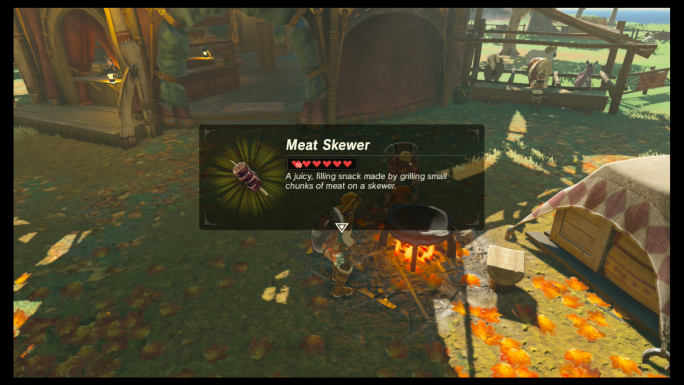
When I first started playing Breath of the Wild, I was extremely conservative with how many trees I felled and how many animals I killed. I was pretty much only taking what I needed at the moment. I often accidentally knocked over trees and I felt bad about it every time. I always felt like I was hurting the environment and I felt actual guilt about this as I played the game, even though trees grow back rather quickly. When it came to animals, I killed them when I could to harvest meat, but it was never for selling. I saved all the meat I collected and used it to make healing items. The interesting part is that on Twitter I discovered that I wasn’t the only one who felt like this while playing the game. But eventually my environmentalism became too big a hindrance to my gameplay. With trees, this started when I was doing the “From the Ground Up” side quest line. This required you to give an NPC tons of wood. More wood than I had even collected up to that point. Suddenly I found myself indiscriminately destroying trees one after the other in the pursuit of large quantities of wood. I distinctly remember a moment where I had wiped out all the trees in a specific area and I felt genuinely bad about it. Caring about respecting the environment within the game had forced me to have to spend like an hour harvesting wood. And by the end of this ordeal I was done with respecting the trees. If I was going to be asked to provide NPCs with such large quantities of wood then I wasn’t going to stop farming it until I needed it again. Suddenly I was downing trees all the time while working on other stuff just to grow my wood stores in case I needed a bunch of it again.
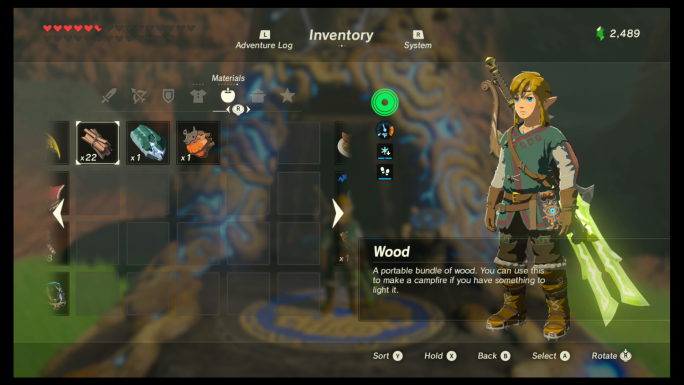
Killing animals had a similar trajectory for me. At first I wasn’t killing them too often and I was using all the meat for myself. Then Reddit told me that selling meat skewers was the most effective way to make money. After many hours of not being able to afford the items I wanted and having to struggle just to buy additional arrows, this information was a godsend. I could hunt animals for pretty much free with my bombs and melee weapons and could never kill enough of them because I needed so much money. And really there is now end to the amount of money you can have because there’s no wallet limit, at least none that I’ve managed to reach yet, and you will never not have things that would be useful to buy. Especially when it comes to ancient weapons, which have a finite lifespan. I was killing animals a lot more and specifically for profit. I was even targeting specific animals because of higher quality meat yields which sell for more money. I had become the equivalent of a fur trapper in the colonial United States, mindlessly killing whatever animals I could find for profits. But this wasn’t even enough to satisfy my greed. Then I unlocked the Master Cycle and eventually made my way to Tabantha Tundra. This is straight up the North American wilderness at the beginning of The Revenant (2015). Except I have a motorcycle and the ability to wield a spear while riding it. I blaze across that frozen plain killing every animal I can find (wolves, moose, and rhinos) for a hefty return of meat. I can quickly farm several thousand rupees this way in under an hour. If I could somehow collect the meat without having to leave my motorcycle it would be a perfect system.
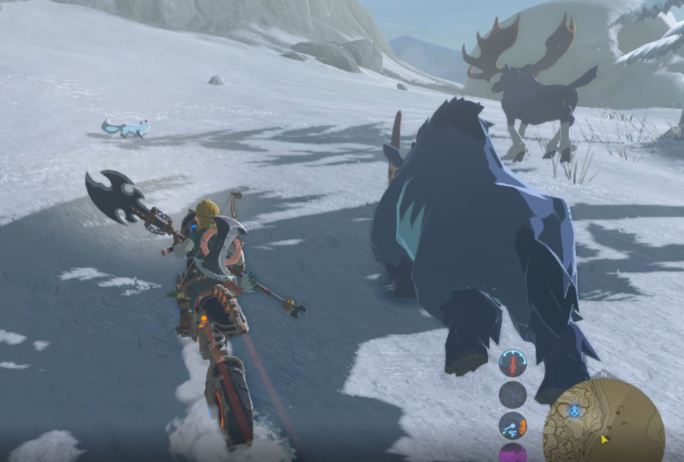
After farming large quantities of meat in the tundra several times I realized that the amount of animals I had killed had grown exponentially. Meanwhile, the amount of meat I was actually eating had shrunk to almost nothing because of the advanced healing power I had attained coupled with much improved armor. No longer did I even need the meat for sustenance. I was just killing animals for profit. It got to the point where I had so much meat that I started using base quality raw meat for motorcycle fuel because it wasn’t valuable enough to take the time to cook and sell like the higher quality meats. I had/have become one of those greedy venture capitalists of the colonial era, destroying and taking everything nature has to offer for my own personal gain.
What really got to me wasn’t so much what I ended up doing to the environment of the game as much as the transition to that point or more accurately the lack thereof. There was no moment where I actively decided that I was no longer going to care about my in game environmentalism. I just became irritated with being poor gradually and slowly found more efficient ways to deal with my resource problems. I hopped on that motorcycle and started hunting from it without a second thought. It was just faster and after so many hours of play I really wanted to speed things up. It wasn’t till far into this behavior that I had even realized it had happened.
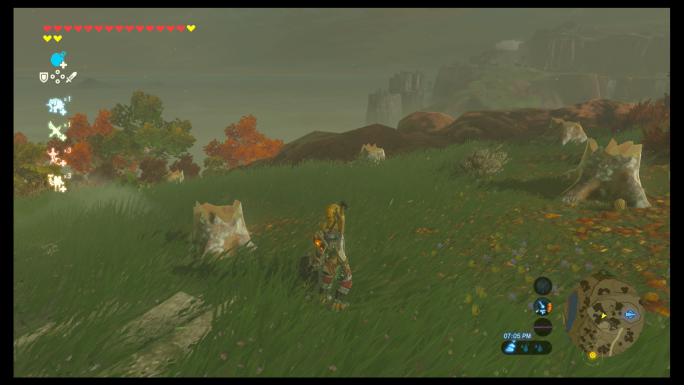
Now I don’t have some profound point I’m trying to make here. I’m not going to change the way I play the game this close to the end because I’m actively trying to complete all my goals as quickly as possible so I can be done with the game and be ready for God of War. But I do wonder what the game would look like in the end if things didn’t instantly grow back when you teleport to a different area. It would be very interesting and probably depressing for me to see what the world would look like after I ravaged it for personal gain.
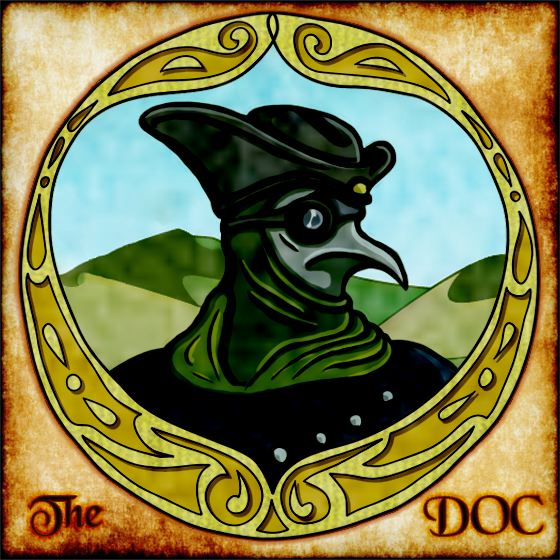


Very interesting read.
Environmentalism was something I also thought about while playing Breath of the Wild, and like you, I decided to apply my own personal values to my gameplay. I even remember watching the E3 2016 demo and thinking “Will I really have to hunt in this game?” and I was pleased when I found out that you didn’t. I’m not a vegan or vegetarian, but the thought of hunting was just off putting, so I decided not to do it.
I also struggled for a while with the poverty issue, and so sought out solutions. I even found the same advice you did: “sell meat skewers.” But my only thought was “Well that’s dumb. I don’t even have that much meat to cook, let alone sell. And why waste valuable arrows? Sure, I could use bombs, but I might destroy some trees while hunting” (my honest thought process). Thankfully, a friend who had had the game since launch told me you could get rich from mining the ore on Death Mountain, and seeing how wealthy they were, I did that instead.
When it came to the ‘From the Ground Up’ side quest, I also found myself grumbling over how much wood I needed to collect. But when I began that mission, I still had a lot of exploring to do, so I just decided that as I continued to explore, I would periodically stop, chop a few trees, and then move on. And after a while of doing that, I found I had collected more than I would need to finish the quest.
I mention all of this because I find it interesting to compare the experiences of two players who began in similar places, but finished very differently. I actually don’t consider the path you took to completing the game to reflect badly on you. It wasn’t that the game suddenly awoke some hidden, greedy monster within you, but rather that the way in which the game was designed rewarded—or least didn’t punish—the kind of behavior you described. Effectively, the developers set up a system in which it paid to destroy. It’s something I noticed early on while playing, and it’s one of my critiques of game. I’ve recently become interested in the ways in which games, through their designs, condition gameplay behavior, and it was quite insightful to read your post.
Thank you very much for sharing.
LikeLiked by 1 person
Thanks you for the comment. I always appreciate when readers give serious thought to my posts. You’re absolutely right in saying the game, like most games, is built to reward destructive behavior. I find it interesting when players find ways to beat games differently than intended. Like the guys who won rounds of PUBG without killing anyone. Most games make it very hard to play with a pacifist mindset, which I wouldn’t actually claim to have to begin with. What I really like is when developers reward you for playing with a handicap by choice. Like in Mirror’s Edge how there was a trophy for beating the game without shooting any enemies.
LikeLiked by 1 person
It’s interesting that you mention that, because I often find that I play games with self-imposed handicaps. It can be a bit of drag sometimes since games keep pushing you to play the “easy way,” so it is nice when there’s at least a small gesture of acknowledgement for your effort, such as an achievement.
More than that though, I’d liked to see something similar to what you described at the end of the post—a scenario in which the game would not just respawn wildlife, trees, and other resources every time you left an area. I‘ve thought before about what would’ve made ‘Master Mode’ truly a challenge, and this was one idea: make it so that there are environmental consequences to the behaviors of the player. Nintendo said the idea for the game’s title came from the realization that the most important element of the game was not a character or item, but the world itself. Well, if that’s how you really feel, then wouldn’t it seem appropriate for there to be at least some lasting effects on the environment? If a player deforests or overhunts, they shouldn’t expect the game to instantly respawn everything, and should maybe have to deal with the consequences for a time.
Although, I have been told by some people that they prefer their games to not have consequences, because it means they can do whatever they want. After all, “it’s not real.” But I’ve always found that line of reasoning to be troubling—the assumption that the absence of any lasting effects justifies destructive and/or exploitative behavior.
That’s just my opinion anyway.
LikeLiked by 1 person
The one problem I could see with lasting environmental effects in a game like BotW is that because it’s an open world with so much to do and respawning enemies you need the resources to respawn as well for it to be playable. A finite amount of resources means a finite amount of money and healing items, which wouldn’t really work in that game. If enemies didn’t respawn then it might work, assuming you didn’t keep dying and wasting resources.
The concept only works effectively in survival games with a limited area to explore and finite enemies. 2 of the best examples I can think of being The Last of Us and Alien: Isolation.
LikeLike
All good points. I actually wasn’t thinking of the effects being permanent. That would be a bit extreme. And you’re right, the open world style wouldn’t work that well if there were finite resources. But I’m sure that if the developers really wanted to, they could come up with a clever system that would start restoring the wildlife and vegetation after some of time. And the Blood Moon could be unaffected, so monsters and weapons would continue to respawn.
Anyway, it was just a thought I had about how the game could potentially be altered to encourage players to manage natural resources more sustainably.
LikeLiked by 1 person